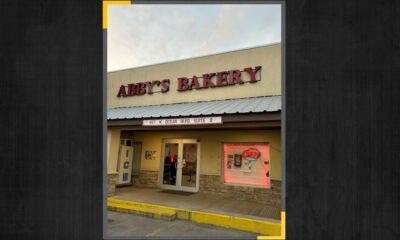Mississippi Today
On this day in 1938


Aug. 16, 1938

Legendary bluesman Robert Johnson lived mysteriously, and on this day, he died just as mysteriously at the age of 27.
Born in Hazlehurst, Mississippi, he reportedly went from a young man with little talent for playing guitar to one of the most influential guitarists of all time. (According to myth, he went to a Delta crossroads and sold his soul to the devil in exchange for playing guitar.)
His cause of death remains a mystery to this day, and so does his burial. There are three headstones in the Mississippi Delta that mark where he may or may not be buried. He
Johnson recorded his first session in Room 414 of the Gunter Hotel in San Antonio and reportedly sang while facing the wall. Despite the fact he recorded only 29 songs, his work became a huge influence, first in blues music, and then in the rock and roll that followed.
In 1986, he was inducted into the inaugural class of the Rock and Roll Hall of Fame and was later inducted into the Grammy Hall of Fame. The Rolling Stones, Bob Dylan and Led Zeppelin are among the many who have cited his influence. Guitarist Eric Clapton has called Johnson “the most important blues singer that ever lived.”
This article first appeared on Mississippi Today and is republished here under a Creative Commons license.![]()
Mississippi Today
Senate passes its income tax cut plan
Senate passes its income tax cut plan
The Senate voted Monday evening to pass a tax cut that reduces the state income tax and the sales tax on groceries while raising the gasoline tax, setting up negotiations with the House.
The measure passed the GOP-majority Senate 34-15, with four Democrats supporting it and four Republicans opposing it. It now heads to the House, whose leadership is advocating for its own plan, which would eventually eliminate the state individual income tax.
The Senate plan amounts to a net tax cut of $326 million, a more modest sum than the $1.1 billion net cut passed by the House. The Senate would reduce the state’s flat 4% income tax to 2.99% over four years, while the House would eliminate the income tax over more than a decade.
Senate Finance Chairman Josh Harkins, a Republican from Flowood, told reporters that the legislation was a responsible way to cut taxes while slightly increasing the gasoline tax to provide more revenue for infrastructure funding.
“I think we’ve put forward a really good plan that helps families at the grocery store by lowering the sales tax on groceries,” Harkins said. “And it provides incentives and rewards work.”
The Senate plan would reduce the state’s 7% sales tax on grocery items, the highest in the nation, to 5% starting July 2025. Municipalities receive a portion of grocery tax revenue, and the Senate plan would make cities whole.
The Senate bill would raise the state’s 18.4-cents-a-gallon gasoline excise by three cents yearly over the next three years, eventually resulting in a 27.4 cents-per-gallon gas tax at completion. This is an effort to help the Mississippi Department of Transportation with a long-running shortfall of highway maintenance money.
Most of the chamber’s Democratic members opposed the plan over fears that the state could not afford to wipe out around half a billion dollars each year from its budget and still address some of the state’s critical issues such as public education and health care.
“That’s a lot of money, and we need that money for basic infrastructure,” Democratic Sen. Hob Bryan of Amory said. “Everyone benefits from infrastructure.”
Some Democratic members attempted to amend the bill to eliminate the grocery tax or change the tax structure to avoid increasing the gas tax. But the GOP-majority chamber on party-line votes defeated the amendments.
Four Republican senators voted against the final measure because it raised the gasoline tax, something they viewed as going against the GOP’s core ideology.
Sen. Angela Burks Hill, a Republican from Picayune, told reporters the gas tax increase would hurt rural people the most because they have to drive further for work and to purchase groceries.
“I’m just trying to follow my party’s platform of low taxes,” Hill said.
Now that both chambers at the Capitol have passed separate tax proposals, the key question will be how much legislative leaders can compromise on a final package. House Speaker Jason White, a Republican from West, and Republican Gov. Tate Reeves have said abolishing the income tax is their primary goal this session.
White previously told Mississippi Today that he’s willing to compromise with the Senate, but he wants a final tax cut that’s substantive and meaningful.
“We’re not interested in a small piece of a tax cut while not addressing other issues,” White said.
Reeves has thrown cold water on the Senate’s proposal because it doesn’t entirely eliminate the income tax. If lawmakers can’t agree on a proposal, he could call them into a special session to address taxes.
Harkins, though, said he hopes lawmakers can “build consensus” on a final package during the regular session. House and Senate leaders will likely debate the measure for the next month. The deadline for lawmakers to approve tax and appropriations bills is March 31.
This article first appeared on Mississippi Today and is republished here under a Creative Commons license.![]()
Mississippi Today
City goes to the suburbs, and Germantown is the winner
City goes to the suburbs, and Germantown is the winner

Can’t tell you how many times I’ve been asked this question in recent years: What has happened to Jackson Public Schools basketball?

Good question.
And I do know the answer, at least a large part of it. But first some background.
Used to be, you could count on several JPS powerhouses to bring huge crowds to the State Tournament at Mississippi Coliseum every February to watch Murrah, Lanier, Provine, Callaway and Jim Hill teams that annually produced some of the greatest basketball talent in Mississippi history. Often, fire marshalls stepped in and locked the Coliseum doors with still hundreds of fans outside hoping to get in.
That’s no longer the case. Not a single JPS boys team made it to the State semifinals this year. (The Lanier girls will play Choctaw County in a 4A semifinal game Wednesday afternoon.) Even just a decade ago, no JPS boys teams in the State Championships would have been heresy. This is not to say that the Jackson metro area is not represented at the Big House. Northwest Rankin, Brandon, Germantown and Madison Central teams all played in the semifinals on Monday. The Canton girls and boys will play Tuesday.
The suburbs are killing it. Inner city Jackson is not.

OK, so here’s a major reason why: In many cases, the city has moved to the suburbs. This is best illustrated by how the Germantown team from out Gluckstadt way hammered Biloxi 55-30 in the Monday noon Class 7A semifinals.
There were Germantown guards Michael and Mason Williams controlling the flow of the game with their ball-handling, passing and defensive skills. There was 7-footer Sam Funches IV dominating the paint at both ends with his length, nifty footwork and soft touch around the basket. There was guard/forward Michael Johnson contributing in so many ways with hustle and grit. And there was Devin Moore, a sturdy, 6-5 guard/forward scoring nine points on just five shots and also contributing five rebounds, three assists and two steals.
Here’s the deal: Michael Williams (a senior) and Mason Williams (a junior) are the sons of Mo Williams the former Murrah, Alabama and NBA great who now coaches at Jackson State. Funches is the son of Sam Funches III, who also played at Murrah, was recruited by Jim Calhoun at Connecticut and finished his career at North Texas. Johnson’s dad, Trey, played at Murrah and then was the SWAC Player of the Year at Jackson State before a long professional career in the NBA and overseas. Moore’s dad and an uncle both played at Jim Hill. Now, all live in Madison County and have turned the Germantown Mavericks, 23-5, into a powerhouse. The Mavs will play neighboring Madison Central in the 7A championship game, which will be played Thursday night at 8 p.m.
Said Mo Williams, who watched Monday’s proceedings from a seat in the Germantown cheering section, “It’s pretty obvious, isn’t it? It’s like the city has moved to the ‘burbs.”
We weren’t three minutes into the Germantown-Biloxi game when brothers Michael and Mason Williams combined to make a play that reminded we longtime Jackson-area fans of the kind of plays their daddy made at Murrah. Mason lofted a high, looping alley-top pass high above the basket. Michael , who will play for his dad at Jackson State, soared high above the rim and slammed the ball through to give the Mavs a lead they never relinquished.
Michael dunked again moments later, swished a three-pointer after that, and then scored on a spin move and a mid-range jumper seconds later. Before you knew it, a 7-6 deficit turned into at 21-11 lead,
Meahwhle, Funches IV, a 16-year-old junior, showed why virtually every college basketball coach in the country is recruiting him. Yes, he needs to get stronger. He could be – and probably will be – more aggressive. But you can’t teach a kid how to be 7 feet tall, and you can’t teach the deft shooting touch he already possesses. That’s inherited. These Germantown players inherited well.
This time last year, Mo Williams’ sons were helping Jackson Academy win the overall private schools state championship at Jackson Academy. Now they are trying to win a public schools championship.
Michael asked me: “Has anybody ever done that?”
I don’t know. I thought Andy Kennedy, the former Ole Miss and current UAB coach, might have done it back when he still had hair and transferred from Winston Academy to Louisville High School. But Kennedy text-messaged back: ”We won it at Winston but only won the north half at Louisville, got beat in the semifinals at the Coliseum.”
Somebody else might have done it. I don’t know. I do know precious few have had the opportunity.
This article first appeared on Mississippi Today and is republished here under a Creative Commons license.![]()
Mississippi Today
On this day in 1956

Feb. 24, 1956

U.S. Sen. Harry F. Byrd Sr. coined the term “Massive Resistance” to unite white leaders in Virginia in their campaign to preserve segregation. The policy appealed to white Virginians’ racial views, their fears and their disdain for federal “intrusion” into the “Southern way of life.”
Virginia passed laws to deny state funds to any integrated school and created tuition grants for students who refused to attend these schools. Other states copied its approach.
When courts ordered desegregation in several schools in Charlottesville and Norfolk, Virginia Gov. James Lindsay Almond Jr. ordered those schools closed. When Almond continued that defiance, 29 of the state’s leading businessmen told him in December 1958 that the crisis was adversely affecting Virginia’s economy. Two months later, the governor proposed a measure to repeal the closure laws and permit desegregation.
On Feb. 2, 1959, 17 Black students in Norfolk and four in Arlington County peacefully enrolled in what had been all-white schools.
This article first appeared on Mississippi Today and is republished here under a Creative Commons license.![]()
-

 News from the South - Louisiana News Feed4 days ago
News from the South - Louisiana News Feed4 days agoJeff Landry’s budget includes cuts to Louisiana’s domestic violence shelter funding
-

 News from the South - North Carolina News Feed4 days ago
News from the South - North Carolina News Feed4 days agoBills from NC lawmakers expand gun rights, limit cellphone use
-

 News from the South - West Virginia News Feed19 hours ago
News from the South - West Virginia News Feed19 hours ago‘What’s next?’: West Virginia native loses dream job during National Park Service terminations
-

 News from the South - Texas News Feed4 days ago
News from the South - Texas News Feed4 days agoICE charges Texas bakery owners with harboring immigrants
-

 News from the South - Oklahoma News Feed6 days ago
News from the South - Oklahoma News Feed6 days agoRemains of Aubrey Dameron found, family gathers in her honor
-

 News from the South - Florida News Feed6 days ago
News from the South - Florida News Feed6 days agoTrump says AP will continue to be curtailed at White House until it changes style to Gulf of America
-

 Mississippi Today4 days ago
Mississippi Today4 days agoForty years after health official scaled fence in Jackson to save malnourished personal care home residents, unchecked horrors remain
-

 News from the South - Missouri News Feed5 days ago
News from the South - Missouri News Feed5 days agoInterstate 44 reopens following mass traffic












































